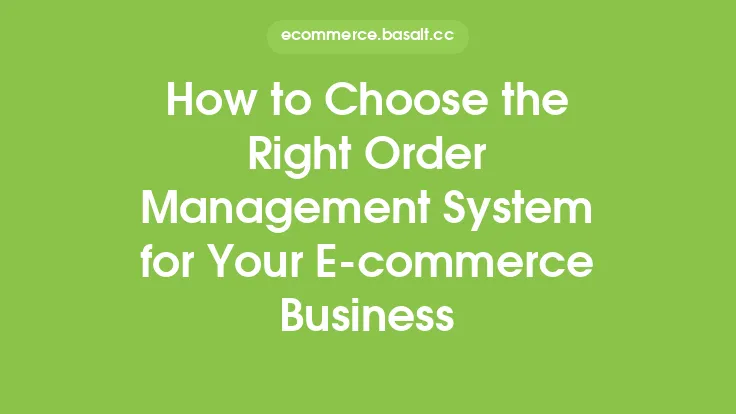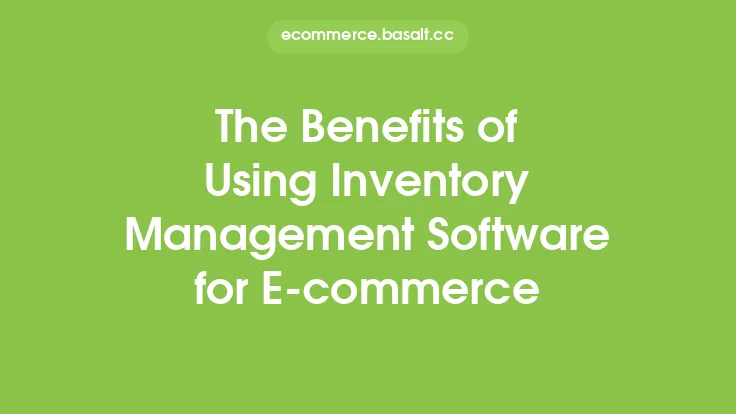As an e-commerce business owner, managing your inventory effectively is crucial to ensuring the smooth operation of your online store. With so many inventory management software options available, choosing the right one can be a daunting task. The right inventory management software can help you streamline your inventory processes, reduce costs, and improve customer satisfaction. In this article, we will explore the key factors to consider when selecting an inventory management software for your e-commerce business.
Understanding Your Business Needs
Before selecting an inventory management software, it's essential to understand your business needs. Start by assessing your current inventory management processes, including your ordering, storage, and shipping procedures. Identify areas where you need improvement, such as reducing stockouts, improving order fulfillment, or enhancing inventory tracking. Consider your business size, growth plans, and the types of products you sell. This information will help you determine the features and functionality you need in an inventory management software.
Evaluating Software Options
Once you have a clear understanding of your business needs, you can begin evaluating inventory management software options. Look for software that is specifically designed for e-commerce businesses and offers features such as inventory tracking, order management, and reporting. Consider the scalability of the software, as well as its ability to integrate with your existing e-commerce platform, accounting software, and other business systems. You should also evaluate the software's user interface, ease of use, and customer support.
Key Features to Consider
While the specific features you need will depend on your business requirements, there are several key features to consider when evaluating inventory management software. These include:
- Inventory tracking: The ability to track inventory levels, locations, and movements.
- Order management: The ability to manage orders, including processing, shipping, and fulfillment.
- Reporting and analytics: The ability to generate reports and analyze data on inventory levels, sales, and customer behavior.
- Integration: The ability to integrate with your e-commerce platform, accounting software, and other business systems.
- Automation: The ability to automate tasks, such as ordering and inventory updates.
- Security: The ability to secure your inventory data and prevent unauthorized access.
Cloud-Based vs. On-Premise Solutions
Another important consideration is whether to choose a cloud-based or on-premise inventory management software. Cloud-based solutions offer greater flexibility, scalability, and cost savings, as they can be accessed from anywhere and do not require significant upfront investment. On-premise solutions, on the other hand, offer greater control and security, as they are hosted on your own servers. Consider your business needs and IT infrastructure when deciding between a cloud-based and on-premise solution.
Implementation and Support
Once you have selected an inventory management software, it's essential to consider the implementation and support process. Look for software providers that offer comprehensive implementation services, including training, setup, and customization. You should also evaluate the provider's customer support, including their response times, support channels, and knowledge base. A good software provider should be able to provide ongoing support and maintenance to ensure your inventory management software continues to meet your business needs.
Cost and ROI
Finally, consider the cost and return on investment (ROI) of the inventory management software. Calculate the total cost of ownership, including the initial investment, ongoing fees, and any customization or implementation costs. Evaluate the potential ROI, including cost savings, increased efficiency, and improved customer satisfaction. Choose a software that offers a strong ROI and aligns with your business budget and goals.
Conclusion and Future Outlook
In conclusion, choosing the right inventory management software for your e-commerce business requires careful consideration of your business needs, software options, and key features. By evaluating your business requirements, assessing software options, and considering key features, implementation, and support, you can select an inventory management software that streamlines your inventory processes, reduces costs, and improves customer satisfaction. As the e-commerce landscape continues to evolve, it's essential to stay up-to-date with the latest inventory management software trends and best practices to ensure your business remains competitive and efficient. By investing in the right inventory management software, you can position your e-commerce business for long-term success and growth.





